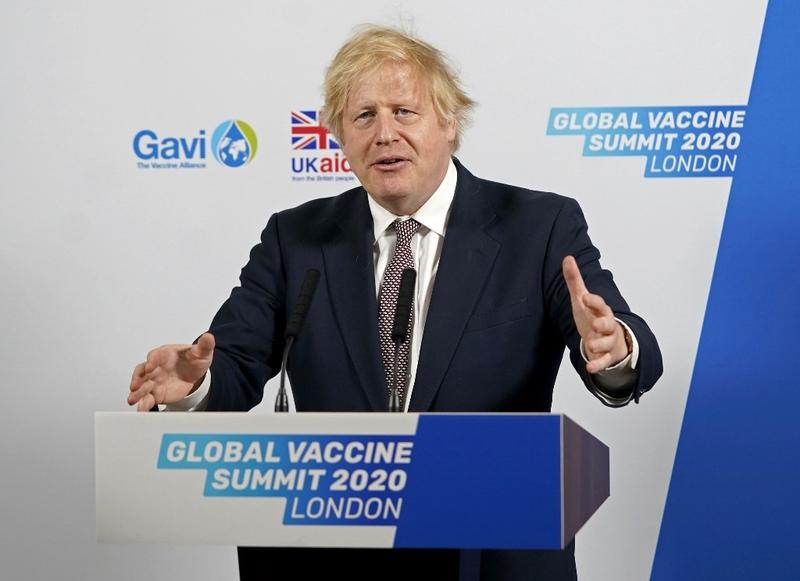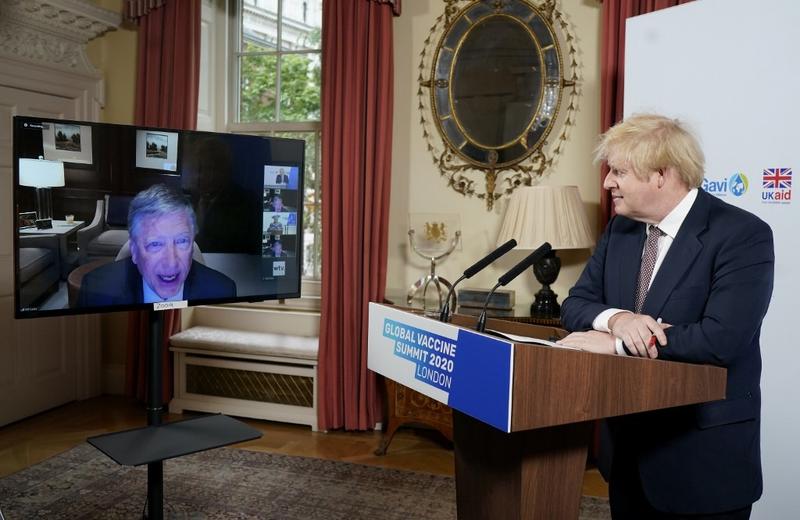 A handout image released by 10 Downing Street, shows Britain's Prime Minister Boris Johnson delivering his speech at the the Global Vaccine Summit hosted from 10 Downing Street in central London on June 4, 2020. (ANDREW PARSONS / 10 DOWNING STREET / AFP)
A handout image released by 10 Downing Street, shows Britain's Prime Minister Boris Johnson delivering his speech at the the Global Vaccine Summit hosted from 10 Downing Street in central London on June 4, 2020. (ANDREW PARSONS / 10 DOWNING STREET / AFP)
LONDON/BRUSSELS - The Global Vaccine Summit hosted by Britain virtually on Thursday drew pledges of US$8.8 billion, far more than its target of US$7.4 billion, showing "historic commitments" made by world leaders to provide equal access to vaccines for all.
To provide access to COVID-19 vaccines for low- and middle-income countries, the Global Vaccine Summit also raised US$567 million for new innovative financing instruments
'Historic commitments'
British Prime Minister Boris Johnson opened the Global Vaccine Summit virtually, urging countries and organizations to pledge funding for vaccinations to save millions of lives in the poorest countries and protect the world from future outbreaks of infectious diseases.
Addressing attendees from over 50 countries and organizations, Johnson said in his opening speech that the summit is a moment "when the world comes together to unite humanity in the fight against the disease."
ALSO READ: Li stresses accessibility, affordability of a vaccine
"I urge you to join us to fortify this lifesaving alliance and inaugurate a new era of global health cooperation, which I believe is now the most essential shared endeavor of our lifetimes," he added.
With a target of US$7.4 billion for Gavi, the Vaccine Alliance, the summit raised US$8.8 billion from 32 donor governments and 12 foundations, corporations and organizations, said Gavi, noting that world leaders has made "historic commitments."
Britain pledged 1.65 billion pounds (about US$2.07) to Gavi over the next five years, according to Johnson.
While Britain remains Gavi's largest donor, other top donors include the Bill & Melinda Gates Foundation and European countries such as Norway and Germany. Eight countries made their first ever pledge to Gavi, including Bhutan, Burkina Faso, Cameroon, Finland, Greece, New Zealand, Portugal and Uganda, according to Gavi.
China also pledged support to relevant international organizations, including Gavi, within its capacity and make contributions to vaccine accessibility and affordability in developing countries.
Ambitious plan
In specific, the summit is expected to raise money to immunize a further 300 million children in world's poorest countries by 2025, protecting them from deadly diseases like polio, diphtheria and measles, and also helping ensure the global recovery from COVID-19 pandemic.
As the world focuses on tackling novel coronavirus, the World Health Organization (WHO), UNICEF and Gavi have warned that the pandemic is disrupting routine immunization, affecting approximately 80 million children under the age of one across the world.
Health experts have warned that if coronavirus is left to spread in developing countries, this could lead to future waves of infection reaching the developed countries including Britain.
 A handout image released by 10 Downing Street, shows Britain's Prime Minister Boris Johnson (right) listening to billionaire philanthropist Bill Gates via zoom during the the Global Vaccine Summit hosted from 10 Downing Street in central London on June 4, 2020. (ANDREW PARSONS / 10 DOWNING STREET / AFP)
A handout image released by 10 Downing Street, shows Britain's Prime Minister Boris Johnson (right) listening to billionaire philanthropist Bill Gates via zoom during the the Global Vaccine Summit hosted from 10 Downing Street in central London on June 4, 2020. (ANDREW PARSONS / 10 DOWNING STREET / AFP)
If a safe and effective coronavirus vaccine is developed, Gavi will have a role in its delivery around the world.
To provide access to COVID-19 vaccines for low- and middle-income countries, the summit also raised US$567 million for new innovative financing instruments.
"This is the first building block towards a global mechanism to ensure equitable access to future COVID-19 vaccines," Gavi commented on the raise of US$567 million in initial seed money for the financing instrument.
Efforts in Europe
Europe, as one of the hardest-hit regions by the COVID-19 pandemic, has been trying to seek solutions to the pandemic, including vaccines.
After US President Donald Trump decided to terminate its ties with the WHO at the end of last month, German Health Minister Jens Spahn tweeted that Trump's move was "a disappointing backlash for International Health."
"The EU must take a leading role and engage more financially," Spahn said, noting that this would be one of Germany's priorities when it becomes the bloc's rotating presidency on July 1.
READ MORE: UK PM urges funding, global cooperation in vaccine summit
Earlier, Paris and Berlin had already agreed to raise research and development capacities in the field of COVID-19 vaccines and treatments, set up joint strategic stocks of pharmaceutical and medical products, and increase the production capacities of these products in the EU.
For now, several vaccines are in the process of development in Europe including Britain and Germany.
As to the vaccine development, Johnson has said earlier that he wants to see a "much more international approach" to the coronavirus pandemic and a vaccine will be developed "all the faster if we collaborate across countries."


